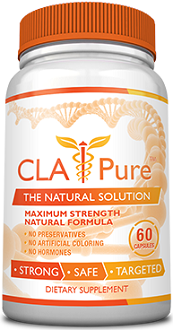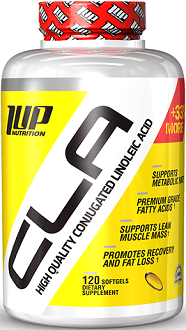The weight-loss and fitness industry is a multi-billion dollar market that is made up of companies that develop diet plans, weight-loss supplement manufacturers, medical professionals, and low-fat food brands.
This industry has seen the rise of many fad diets, quick-fix pills and a host of other techniques that are supposed to help individuals shed the pounds. Recently, the market has experienced some excitement, due to the ‘miracle pill’ known as CLA and its advertised weight-loss benefits.
What Is CLA?
CLA, or Conjugated Linoleic Acid, is classified as a polyunsaturated fat which is found in linoleic acid (essential fatty acid present in plant oils). In nature, this substance can be found as a product of digestion, in ruminant animals.
Rumens are grass-eating animals like cows, sheep, deer, and goats. Therefore it can mainly be found in grass-fed beef.
CLA is an omega-6 fatty acid. And while you may have heard that omega-6 rich diets can cause inflammation of the body, your diet should include a small dose of this polyunsaturated fat (just in lower amounts than the normal American diet).
What Does CLA Do?
 Conjugated Linoleic Acid is said to interfere with the fat storage in the body. Which promotes the process of turning fat into energy, rather than simply storing it. It is also suggested that this substance can help with the development of lean muscle.
Conjugated Linoleic Acid is said to interfere with the fat storage in the body. Which promotes the process of turning fat into energy, rather than simply storing it. It is also suggested that this substance can help with the development of lean muscle.
Conjugated Linoleic Acid’s fat burning properties all burn down its influence on the Peroxisome Proliferator-Activated Receptor (PPAR) system. The PPAR system consists of a group of nuclear receptor proteins that regulate genes and a number of metabolic functions, such as fat-burning and inflammation.
Where Does CLA Come From?
While CLA naturally occurs in ruminant animals such as cattle, the Conjugated Linoleic Acid you find in health shops and stores are predominantly made from Safflower Oil.
Safflower is a highly branched, herbaceous, thistle-like plant that is cultivated commercially for its oil – which is extracted from its seeds. It can also be used in cooking and nutrition.
CLA supplements, that are produced from Safflower Oil, is a fairly new weight-loss aid that has been created for the potential weight-loss benefits alone. This oil is said to break down existing fat while improving metabolism.
A CLA Diet
Due to its presence in many different food sources, such as beef, lamb and veal – to eat a CLA-rich diet would mean a significant increase in calories and fat. However, CLA can also be found in some vegetarian-friendly sources.
You can boost your CLA intake by eating various meats, dairy and some vegetable oils, such as safflower oil.
Here is a brief overview of some foods and the amount of CLA they contain:
- 433 mg CLA – Grass-fed beef (4 oz)
- 270 mg CLA – Cheese (from grass-fed cow milk) (1 oz)
- 240 mg CLA – Whole milk (from grass-fed cows) (8 oz)
- 148 mg CLA – Lamb (4 oz)
- 44 mg CLA – Whole milk (8 oz)
- 44 mg CLA – Buttermilk (8 oz)
- 43 mg CLA – Processed cheeses, average (1 oz)
- 26 mg CLA – Plain yogurt (6 oz container)
- 54 mg CLA – Butter (1 tbsp)
- 22 mg CLA – Cottage cheese (4 oz)
- 71 mg CLA – Fresh ground beef, from regular cows (4 oz)
- 39 mg CLA – Cheddar cheese (1 oz)
- 25 mg CLA – Ice cream (1/2 cup)
- 40 mg CLA – Veal (4 oz)
- 23 mg CLA – Fresh ground turkey (4 oz)
- 8 mg CLA – Chicken (4 oz)
- 3 mg CLA – Safflower oil (1 tbsp)
- 3 mg CLA – Egg yolk (1 large)
- 6 mg CLA – Pork (4 oz)
- 2 mg CLA – Sunflower oil (1 tbsp)
 While CLA might have some benefits for your health, the food that is rich in this substance also contains potentially harmful fats. Beef and dairy products are high-fat foods that have high amounts of saturated fat.
While CLA might have some benefits for your health, the food that is rich in this substance also contains potentially harmful fats. Beef and dairy products are high-fat foods that have high amounts of saturated fat.
Saturated fat has been termed a ‘bad fat’ and is found in high amounts in CLA-dense foods. Linked to potential heart disease and a staggering increase in cholesterol levels – saturated fats should be consumed in moderate levels to avoid increasing the risk of developing these health conditions.
This means that it is difficult to boost your intake of CLA through diet alone, as you would be unable to maintain a healthy balance.
CLA Supplements
Unfortunately, in order to reap the proposed benefits of CLA, the amount of Conjugated Linoleic Acid you can get through diet is not enough. This creates the need for supplements to be added to your weight-loss regime.
As a dietary supplement, CLA Safflower Oil capsules generally consists of 80% pure oil and 20% other ingredients that is said to aid in the absorption of this substance. It should be noted that some studies suggest that Safflower Oil only contains a small amount of CLA (approximately 0.7mg).
Individuals who take these supplements, incorporate them into their daily routine for the purpose of improving their metabolism and developing lean muscle. At present time, this type of CLA is enjoying widespread popularity with some experts predicting a bright future for these weight-loss supplements.
How To Take CLA
 Because your body does not produce CLA naturally, it can only be obtained through diet or taking daily dietary supplements. In order for this substance to work properly, it is recommended that you should take between 3000 and 8000 mg per day.
Because your body does not produce CLA naturally, it can only be obtained through diet or taking daily dietary supplements. In order for this substance to work properly, it is recommended that you should take between 3000 and 8000 mg per day.
Most capsules or pills only contain approximately 1000 mg of CLA, so you would need to take up to eight a day to achieve the desired effect. Consult your product label to find how much you should take.
You can also work out how much Conjugated Linoleic Acid you need by your weight. If you weigh 155 pounds an average of 3 500 mg should be taken daily.
The next step would be to identify the best type of CLA to take. Currently, there are several types of CLA supplements on the market – all differing on a molecular level. It is suggested that the most effective form of CLA is the trans-10, cis-12 isomer. For this reason, you should study the product label carefully before purchasing a potentially ineffective supplement.
If you are unsure about which CLA supplement would work for you, ask a nutritionist or health-industry professional for more information.
CLA Weight Loss Benefits
There are several ways in which CLA can effect and aid your weight loss. As mentioned before, one of these pathways is the influence the 10,12 CLA isomer has over the PPAR system. As it inhibits the genes that are responsible for fat storage, as well as the production of fat cells. In this way, CLA actually prevents you from gaining weight from the get-go.
When your body’s fat storage is reduced it improves liver performance, which allows you to get rid of toxins and fatty deposits more efficiently. Similarly, CLA boosts your system’s energy expenditure, which increases the body’s ability to burn fat.
It is also believed that CLA can make you feel fuller for longer, increasing your satiety. As this weight-loss substance decreases the communication from hunger-signaling factors in the hypothalamus region of the brain. Making you eat less, which makes you lose weight even quicker.
CLA Weight Loss Benefits For Athletes
 When talking about the weight loss benefits of CLA, it is not just the average person on the street trying to lose weight that uses these supplements. Bodybuilders and elite athletes also enjoy the fat-burning benefits that Conjugated Linoleic Acid has to offer.
When talking about the weight loss benefits of CLA, it is not just the average person on the street trying to lose weight that uses these supplements. Bodybuilders and elite athletes also enjoy the fat-burning benefits that Conjugated Linoleic Acid has to offer.
This is because CLA could provide these top-performing sportsmen with some of the essential fitness advantages they need to excel in their respective fields.
CLA helps to boost your metabolism, which is particularly important as athletes need to burn through as many calories as they can in a short amount of time. With a high-caloric intake, these athletes would not be able to stay in the shape they are without a quick metabolic rate.
This substance also helps to build muscle, which is hugely beneficial to athletes who want to improve their performance. CLA assists in muscle production and when this supplement is combined with the right key exercises – you are able to develop parts of the body necessary to e.g. run faster or lift more weight.
CLA also helps the body to decrease insulin resistance, which occurs when there is too much glucose (sugar) in the blood. Insulin resistance is a leading factor in weight gain.
Athletes are unable to perform at their best if they are constantly run down. CLA has also been shown to improve your immune system, which helps your body fight any bacteria or viruses that you may come into contact with.
Proof of CLA Weight Loss Benefits
Due to the interest surrounding this weight-loss supplement, many studies are now investigating the potential benefits and health effects of CLA.
One study, titled “Conjugated Linoleic Acid Reduces Body Fat Mass in Overweight and Obese Humans”, sought to research these effects due to CLA’s ability to reduce body fat mass (BFM) in animals.
Examining the weight-loss outcomes in humans, this study examined the correlation between CLA and the breakdown of fat in fat cells to free fatty acids and fatty acid oxidation from stored fat. With a test group of 40 women and 20 men (aged 18 and above), with BMI’s between 25.1 kg/m2 to 34.9 kg /m2 – some were given a placebo of olive oil (9000 mg) and the others between 1700 and 6800 mg of CLA daily.
After 12 weeks, those who took the CLA capsules were found to have increased in lean body mass and decreased in overall body mass.
CLA Health Benefits
 While the most well-established benefit of CLA is its fat-fighting abilities, this fatty acid also promotes several other health benefits and advantages.
While the most well-established benefit of CLA is its fat-fighting abilities, this fatty acid also promotes several other health benefits and advantages.
These health benefits include:
- CLA could potentially be a cancer prevention agent. In animal studies, it was found that this substance significantly reduced the number of tumors in rats, limited the formation and spreading of new cancer cells and tumors.
- CLA is known to reduce insulin resistance, which is responsible for conditions such as diabetes.
- CLA has the ability to promote bone density and diminish the activity of osteoclasts. Resulting in stronger and healthier bones.
What Are The Side Effects Of CLA
With so many benefits, it is hard to believe that Conjugated Linoleic Acid has any side effects. Unfortunately, studies have uncovered some health concerns, connected to the long-term use of this dietary substance.
While CLA is likely safe when ingested through food sources and potentially safe when taken in medical (supplement) dosages, the use of CLA could cause a list of side effects such as a backache, headache, diarrhea, fatigue, increased risk of bleeding and liver toxicity.
Currently, there is too little evidence surrounding the effects of CLA, but it is advised that children, breastfeeding or pregnant women, diabetics (despite potential insulin benefits), those suffering from metabolic syndrome and individuals who are going for surgery should not use this supplement.
With the potential risk of serious health concerns, it is always advised to be careful with the dietary supplements you take.
The Takeaway
CLA is definitely one of the most popular weight-loss aids on the market today, with more and more people claiming its benefits.
Conjugated Linoleic Acid boasts many proven and speculated health benefits that can possibly help you shed some unwanted pounds. However, it is important to keep in mind that your diet might already include this substance. But that you should not get your CLA intake from food alone as that could lead to health problems.
If you have decided to use CLA for weight-loss, it is always a good idea to consult your doctor or dietitian about whether you should add this dietary supplement to your regime. They will be able to best advise you on the amount your body will need to get thinner.





